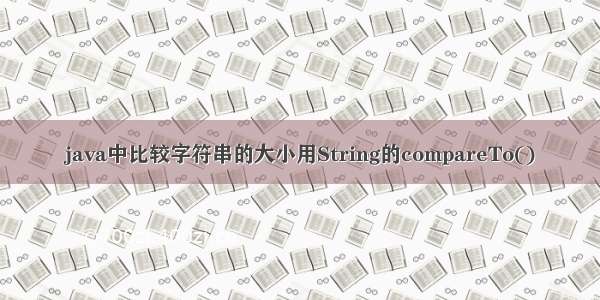
java中compareTo比较两个日期大小
我们对两个日期进行比较的时候,或者是日期的string进行比较的时候,以前我一直以为,如果大于的话compareTo的返回值应该是1,等于的话是0,小于的话是-1,网上很多也是这样说,但是现实中我程序出错,最后打出来,看了一下,如果大于的话返回的是正整数,等于是0,小于的话就是负整数,而不仅仅局限于1,0和-1,以后做比较要注意(这段话出处见此)
日期进行比较
源码
1
2
3
4
5
6
7
8
9
10
11
12
13
14
15
16/**
* Compares two Dates for ordering.
*
* @param anotherDate theDateto be compared.
* @return the value0if the argument Date is equal to
* this Date; a value less than0if this Date
* is before the Date argument; and a value greater than
*0if this Date is after the Date argument.
* @since 1.2
* @exception NullPointerException ifanotherDateis null.
*/
public int compareTo(Date anotherDate) {
long thisTime = getMillisOf(this);
long anotherTime = getMillisOf(anotherDate);
return (thisTime
}
例子
1
2
3
4
5
6
7
8
9
10
11
12
13
14
15
16
17
18
19
20
21
22
23
24
25
26
27
28
29
30
31
32
33
34
35
36package bai.test;
import java.util.Calendar;
import java.util.Date;
import org.junit.Test;
public class CompareTo_Date {
@Test
public void test() {
Calendar c = Calendar.getInstance();
c.set(,5,4);
Date before =c.getTime();
c.set(,5,5);
Date now=c.getTime();
c.set(,5,6);
Date after=c.getTime();
//before早于now,返回负数,可用于判断活动开始时间是否到了
int compareToBefore=pareTo(now);
System.out.println("compareToBefore = "+compareToBefore);
int compareToIntNow=pareTo(now);
System.out.println("compareToIntNow = "+compareToIntNow);
//after晚于now,返回正数,可用于判断活动结束时间是否到了
int compareToIntAfter=pareTo(now);
System.out.println("compareToIntAfter = "+compareToIntAfter);
}
}
输出如下
1
2
3compareToBefore = -1
compareToIntNow = 0
compareToIntAfter = 1
日期的string进行比较
源码
1
2
3
4
5
6
7
8
9
10
11
12
13
14
15
16
17
18
19
20
21
22
23
24
25
26
27
28
29
30
31
32
33
34
35
36
37
38
39
40
41
42
43
44
45
46
47
48
49
50
51
52
53
54
55
56
57
58
59/**
* Compares two strings lexicographically.
* The comparison is based on the Unicode value of each character in
* the strings. The character sequence represented by this
*Stringobject is compared lexicographically to the
* character sequence represented by the argument string. The result is
* a negative integer if thisStringobject
* lexicographically precedes the argument string. The result is a
* positive integer if thisStringobject lexicographically
* follows the argument string. The result is zero if the strings
* are equal;compareToreturns0exactly when
* the {@link #equals(Object)} method would returntrue.
*
* This is the definition of lexicographic ordering. If two strings are
* different, then either they have different characters at some index
* that is a valid index for both strings, or their lengths are different,
* or both. If they have different characters at one or more index
* positions, letkbe the smallest such index; then the string
* whose character at positionkhas the smaller value, as
* determined by using the < operator, lexicographically precedes the
* other string. In this case,compareToreturns the
* difference of the two character values at positionkin
* the two string -- that is, the value:
*
* this.charAt(k)-anotherString.charAt(k)
*
* If there is no index position at which they differ, then the shorter
* string lexicographically precedes the longer string. In this case,
*compareToreturns the difference of the lengths of the
* strings -- that is, the value:
*
* this.length()-anotherString.length()
*
*
* @param anotherString theStringto be compared.
* @return the value0if the argument string is equal to
* this string; a value less than0if this string
* is lexicographically less than the string argument; and a
* value greater than0if this string is
* lexicographically greater than the string argument.
*/
public int compareTo(String anotherString) {
int len1 = value.length;
int len2 = anotherString.value.length;
int lim = Math.min(len1, len2);
char v1[] = value;
char v2[] = anotherString.value;
int k = 0;
while (k < lim) {
char c1 = v1[k];
char c2 = v2[k];
if (c1 != c2) {
return c1 - c2;
}
k++;
}
return len1 - len2;
}
例子
1
2
3
4
5
6
7
8
9
10@Test
public void test() {
String date = "-07-17 11:03:52";
System.out.println("compareToBefore1 : "+pareTo("-06-16 11:03:52"));
System.out.println("compareToBefore2 : "+pareTo("-05-16 11:03:52"));
System.out.println("compareToNow1 : "+pareTo("-07-17 11:03:52"));
System.out.println("compareToNow2 : "+pareTo("-07-17"));
System.out.println("compareToAfter1 : "+pareTo("-07-18 11:03:52"));
System.out.println("compareToAfter2 : "+pareTo("-09-16 11:03:52"));
}
输出如下
1
2
3
4
5
6compareToBefore1 : 1
compareToBefore2 : 2
compareToNow1 : 0
compareToNow2 : 9
compareToAfter1 : -1
compareToAfter2 : -2
















